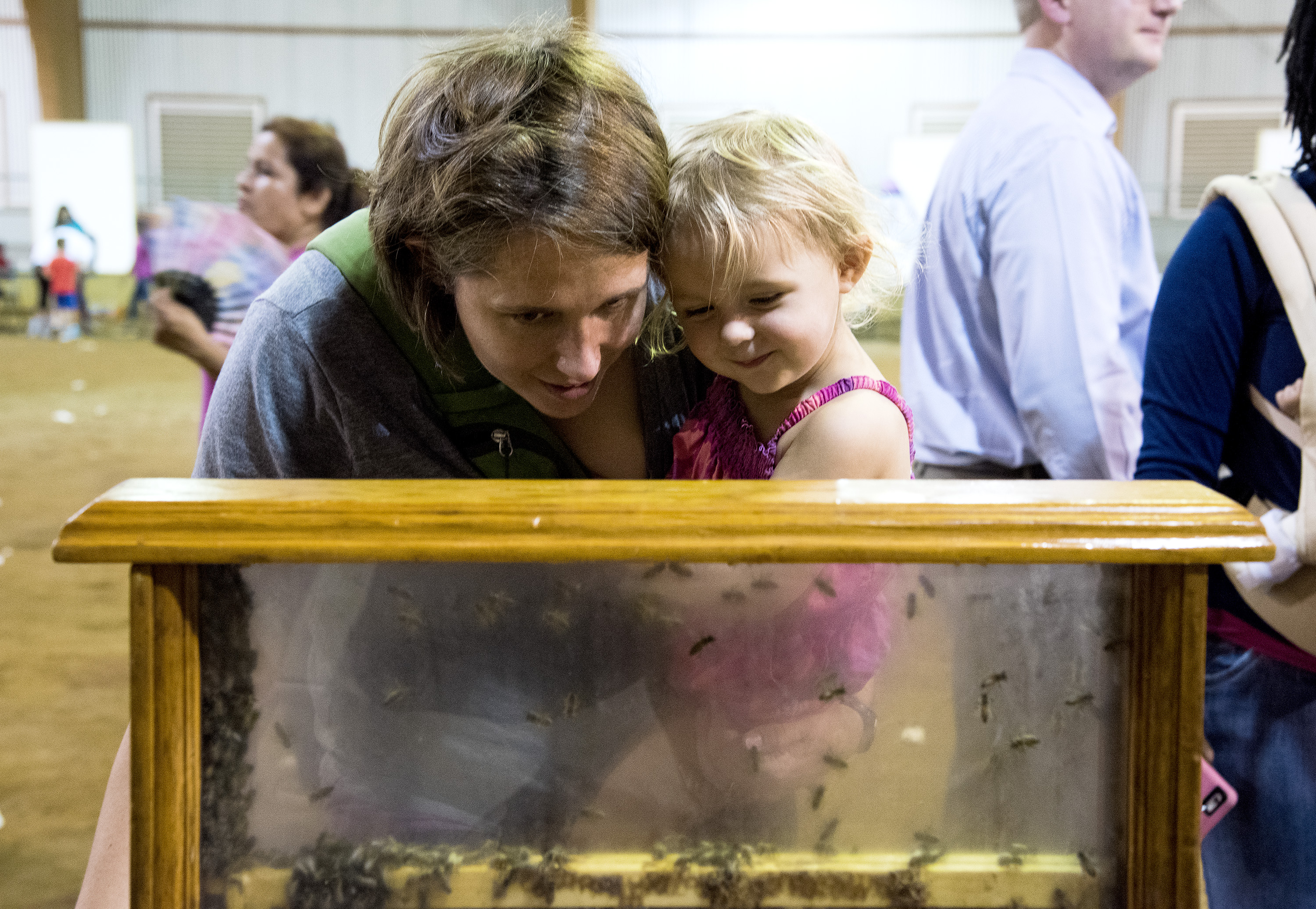Oct. 11 Arkansas Insect Festival a unique mix of learning, roach races, musical theater
Sept. 12, 2018
Oct. 11 Arkansas Insect Festival a unique mix of learning, roach races, musical theater
By Sarah Cato
U of A System Division of Agriculture
Fast facts:
- Arkansas Insect Festival hits 16th edition on Oct. 11.
- Will be held in the Whitaker Animal Science Center in Fayetteville
- Visitors will be able to hold arthropods, race cockroaches and much more
(562 words)
(Newsrooms – with file art of past Arkansas Insect Festival here: https://flic.kr/s/aHskP7gfg3)
Download Word version
FAYETTEVILLE, Ark. – See a house of monarchs. Cheer the longshots at the cockroach races. Take in a little entomological musical theater. There’s only one place to do all this: the 16th Arkansas Insect Festival on Oct. 11 at the Pauline Whitaker Animal Science Center.
The Department of Entomology at the University of Arkansas’s Fayetteville campus began the insect festival as a way to introduce students and others to see, touch and learn about insects and the study of entomology. The Arkansas Insect Festival typically draws about 3,000 students, teachers and others.

“We have a zoo of living arthropods from tarantulas, to giant walking sticks, to giant cockroaches and all kinds of other insects,” said Donald Steinkraus, professor of Entomology for the Bumpers College of Agricultural, Food and Life Sciences, and the University of Arkansas System Division of Agriculture. “The visitors can hold some of these living arthropods as well as talk to the experts about them.
“We have a glassed-in small house full of live monarchs and other butterflies,” Steinkraus said. “We a have race track for cockroaches and visitors can cheer on their favorite cockroach as they run down the track. We’ll also have an insect musical theater where actors and musicians wear giant bug costumes and put on skits about insect life cycles and biology.”
In the 2016 festival, Hillary Fischer, a PhD student for the department of Entomology and Plant Pathology, was one of the lucky graduate students roped into dressing in an oversized costume and performing in the skits.
“I was a spider and I used Silly String to trap another grad student dressed as a fly in my web,” Fischer said. “It was a fun and silly way to teach the kids about biology and insect lifestyles.”
PhD student Austin Jones said he sticks with leading the cockroach races.
“We set up six tracks and have a Madagascar hissing cockroach in each lane and the students yell and pound on the table, trying to coach their favorite cockroach to win,” said Austin Jones, PhD student for the department. “It’s one of the more popular events. They all want to see the cockroaches race and scurry down the track.”
The full list of displays and activities:
- Insect museum
- Arthropod zoo
- Butterfly house
- Cockroach races
- Honey bee display
- Insect musical theater
- Insects and ticks of medical and veterinary importance
- Microscope display
- Cotton patch
- Insect crafts
- Scientific displays
- Insects in forests
- Master Naturalists
- Master Gardeners
The festival is always a hit and never fails to highlight the beauty and importance of entomology.
“First, visitors will have a lot of fun.” Steinkraus said. “The cockroach races, the musical theater and crafts are very fun. Second, they will learn about insect diversity and the important role insects play in agriculture, nature and ecosystems. Third, they will find that many insects are beautiful. Fourth, they will be able to closely examine insects and touch living ones in the zoo as well as look at them through microscopes.”
“I hope visitors will leave with a greater appreciation of insects and their interactions with humans, plants birds, agriculture and health,” Steinkraus said. “In fact, we have been having the festival since 1993 and people come to me, now adults, and tell me they went to the festivals as children and have never forgotten them.”
For more information on the Insect Festival, visit https://entomology.uark.edu/services-and-outreach/insect-festival.php
About the Division of Agriculture
The University of Arkansas System Division of Agriculture’s mission is to strengthen agriculture, communities, and families by connecting trusted research to the adoption of best practices. Through the Agricultural Experiment Station and the Cooperative Extension Service, the Division of Agriculture conducts research and extension work within the nation’s historic land grant education system.
The Division of Agriculture is one of 20 entities within the University of Arkansas System. It has offices in all 75 counties in Arkansas and faculty on five system campuses.
Pursuant to 7 CFR § 15.3, the University of Arkansas System Division of Agriculture offers all its Extension and Research programs and services (including employment) without regard to race, color, sex, national origin, religion, age, disability, marital or veteran status, genetic information, sexual preference, pregnancy or any other legally protected status, and is an equal opportunity institution.
About the Dale Bumpers College of Agricultural, Food and Life Sciences
Bumpers College provides life-changing opportunities to position and prepare graduates who will be leaders in the businesses associated with foods, family, the environment, agriculture, sustainability and human quality of life; and who will be first-choice candidates of employers looking for leaders, innovators, policy makers and entrepreneurs. The college is named for Dale Bumpers, former Arkansas governor and longtime U.S. senator who made the state prominent in national and international agriculture.
Pursuant to 7 CFR § 15.3, the University of Arkansas System Division of Agriculture offers all its Extension and Research programs and services (including employment) without regard to race, color, sex, national origin, religion, age, disability, marital or veteran status, genetic information, sexual preference, pregnancy or any other legally protected status, and is an equal opportunity institution.
# # #
Media Contact: Mary Hightower
Dir. of Communication Services
U of A Division of Agriculture
Cooperative Extension Service
(501) 671-2126
mhightower@uada.edu